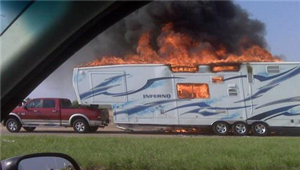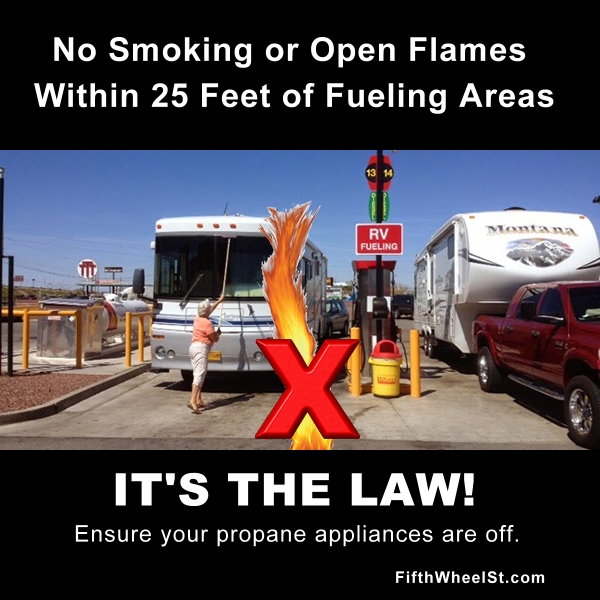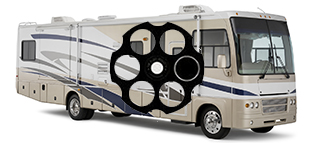
RV fires occur every day in the United States. The latest records from the The National Fire Protection Association (NFPA) estimates that 20,000 RV fires occur annually.
We don't always know the actual cause of some of these fires but most are preventable. Please, pay attention to the following RV safety tips.
At best, a fire in your RV can delay or ruin a vacation. At worst, it can mean injury, financial loss, and even death. Unfortunately, RV fires are one of the largest causes of RV loss in America today. The following tips can help you recognize the most common fire hazards and protect yourself from the damage and injury fires are notorious for causing.
 There are plenty of fire and life safety tools that can save lives, but for them to be effective, they must be in working condition and you must know how to use them properly.
There are plenty of fire and life safety tools that can save lives, but for them to be effective, they must be in working condition and you must know how to use them properly.Bonus number 35. Install an automatic fire suppression system at the top rear of the refrigerator compartment and in a motorhome engine compartment.
Here is a true story about a fire suppression system ordered that didn't get installed soon enough.
How to install a fire suppression system in the motorhome engine compartment.
The above first 34 tips is contributed by Mac McCoy (a.k.a. Mac the FireGuy) and is reprinted with his permission. Mac McCoy served 33 years in the fire service. He holds a BS degree in Fire Science and a Masters degree in Fire Administration. Mac has served as a firefighter, paramedic, Captain, Assistant Chief of Training, Deputy Sheriff, and for 12 years as the Fire Training Coordinator of Oregon's Fire Marshall's Office and Public Safety Academy. During his tenure with Oregon Fire Marshall's Office, Mac helped pioneer the states HAZMAT program. Mac has taught civilians, military, firefighters and law enforcement firefighting skills and techniques in the United States and abroad.

Once, an RVer stated that "Gas, diesel and propane are all highly volatile." Statements like this from poorly educated RVers are, well, to put it bluntly, are wrong and it's an act of brain negligence. Here are some true facts about the most common fuels used in RVs.
Flash Points
Definition: The flash point of a volatile material is the lowest temperature at which it can vaporize to form an ignitable mixture in air.
Propane: -156 °F
Gasoline: -45 °F
Diesel: 140 to 176 °F
Volatile Liquid Fuel—Reid Vapor Pressure (RVP)
40 CFR § 1037.801 (Definitions): "Volatile liquid fuel means any fuel other than diesel or biodiesel that is a liquid at atmospheric pressure and has a Reid Vapor Pressure (RVP) higher than 2.1 pounds per square inch."
RVP (psi @ 100 degrees F.)
Propane: 208
Gasoline: 8-15
No.2 Diesel: <0.2
Resource: Fuel Safe Handling Technical Bulletin
Q: I've been traveling with my propane and fridge on forever. I've never had problem. Do I really need to shut the propane off?
A: You and so many other RVers have just been lucky so far. That's good for you and them. 
Are you up to playing a game of Russian roulette? Really, that's what you may be doing. Of course, not all fires are directly related to propane or even having the propane on while traveling. But, when propane tanks are on, the gas lines remain pressurized. A continuous flow of pressurized propane will exacerbate any fire in an RV whenever the lines are severed.
What's true and has been reported 100% of the time, is everyone who experienced a fire said something like "I never thought it would happen to me." Sadly, some did not even get to say those words.
Q: Won't my food in the fridge get too warm and my frozen items thaw?
A: One of the things most of us learned early in our life was not to open the fridge and freezer when the AC power went out in our homes. Why? Because the food would stay cold or frozen for several hours without power. The same holds true for our RV fridge and freezer. I have traveled occasionally up to 7.5 hours with the propane and power off on the fridge. The fridge temp never went above 40 degrees and all the frozen food was still solid. That is the key to keeping your food cold and frozen without any power source during travel. If you want to eat your food during travel, get what you need before traveling and put it in an ice chest.
Q: What do the fridge manufacturers have to say about running the it on LP gas during travel?
A: This is Dometic's response: "Thank you for contacting Dometic. Certain states prohibit consumers from operating the refrigerator on gas while traveling on the road. Dometic's position is to support these regulations and not produce a written document advising consumers to the contrary."
Norcold never replied.
Please prevent RV fires and travel safely.
©2013, David W. Gray, all rights reserved. No portion of this article shall be reprinted without the permission of myself and the 34 safety tips author.
©2011-2025 Fifth Wheel Street and Fifth Wheel St. All Rights Reserved. Use of this website constitutes acceptance of the Privacy Statement and Terms and Conditions of Use.